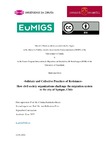Mostrar o rexistro simple do ítem
Solidary and collective practices of resistance: how civil society organizations challenge the migration system in the city of Iquique, Chile
| dc.contributor.advisor | Fernandez-Bessa, Cristina | |
| dc.contributor.advisor | Ballesteros-Pena, Ana | |
| dc.contributor.author | Groos, Marielena | |
| dc.contributor.other | Universidade da Coruña. Facultade de Socioloxía | es_ES |
| dc.date.accessioned | 2022-10-25T12:52:32Z | |
| dc.date.available | 2022-10-25T12:52:32Z | |
| dc.date.issued | 2022 | |
| dc.identifier.uri | http://hdl.handle.net/2183/31874 | |
| dc.description.abstract | [Abstract] The city of Iquique is currently characterized by a new migration phenomenon due to migrants entering through unauthorized border crossings since the border closure legitimized by pandemic prevention. Considering that global migration regimes have similar dynamics in different geographic locations but encounter different local processes, this thesis aims to analyze the specific materialization of the migration system in this local context. Therefore, I explore how civil society organizations challenge the migration system at the local level and what practices of resistance can be identified. To this end, problem-centered interviews were conducted with civil society organizations engaged in migrant struggles in the city. It was found that the migration system is challenged at the local level through various practices of solidary and collective resistance from below. However, it was also identified that the criminalization of solidarity as a tool of governmental migration control is a response to the local challenge of the migration system. | es_ES |
| dc.description.abstract | [Resumen] La ciudad de Iquique se caracteriza actualmente por un nuevo fenómeno migratorio debido al ingreso de migrantes por pasos fronterizos no autorizados desde el cierre de la frontera legitimado por la prevención de la pandemia. Considerando que los regímenes migratorios globales tienen dinámicas similares en diferentes lugares geográficos, pero encuentran procesos locales diferentes, esta tesis busca analizar la materialización específica del sistema migratorio en este contexto local. Por lo tanto, exploro cómo las organizaciones de la sociedad civil desafían el sistema migratorio a nivel local y qué prácticas de resistencia se pueden identificar. Para ello, se realizaron entrevistas centradas en el problema con organizaciones de la sociedad civil que participan en las luchas de los migrantes en la ciudad. Se constató que el sistema migratorio es desafiado a nivel local a través de diversas prácticas de resistencia solidaria y colectiva desde abajo. Sin embargo, también se identificó que la criminalización de la solidaridad como herramienta de control migratorio gubernamental es una respuesta al desafío del sistema migratorio a nivel local. | es_ES |
| dc.language.iso | eng | es_ES |
| dc.rights | Atribución 3.0 España | es_ES |
| dc.rights.uri | http://creativecommons.org/licenses/by/3.0/es/ | * |
| dc.subject | Civil society organization | es_ES |
| dc.subject | Migration regime | es_ES |
| dc.subject | Practices of resistance | es_ES |
| dc.subject | Criminalization of solidarity | es_ES |
| dc.subject | Organización de la sociedad civil | es_ES |
| dc.subject | Régimen migratorio | es_ES |
| dc.subject | Prácticas de resistencia | es_ES |
| dc.subject | Criminalización de la solidaridad | es_ES |
| dc.title | Solidary and collective practices of resistance: how civil society organizations challenge the migration system in the city of Iquique, Chile | es_ES |
| dc.type | info:eu-repo/semantics/masterThesis | es_ES |
| dc.rights.access | info:eu-repo/semantics/openAccess | es_ES |
| dc.description.traballos | Traballo fin de mestrado (UDC.SOC). Políticas sociais e intervención sociocomunitaria. Curso 2021/2022 | es_ES |






